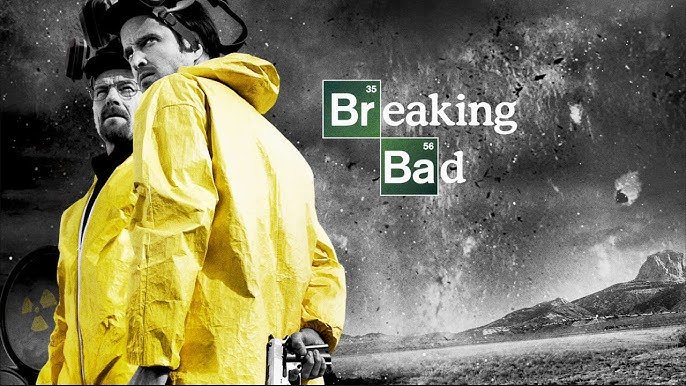Title: Breaking Bad
Seasons Covered: 3 & 4
Genre: Crime, Thriller, Drama
Creator: Vince Gilligan
Overview of Breaking Bad
Breaking Bad follows the transformation of Walter White, a mild-mannered high school chemistry teacher who, upon being diagnosed with terminal cancer, turns to cooking and selling methamphetamine. As he delves deeper into the drug trade to secure his family’s financial future, Walter’s life and relationships unravel, revealing a dark side as he grapples with ambition, survival, and morality.
Seasons 3 and 4 mark Walter White’s shift from a desperate, small-time meth cook to a calculating criminal willing to sacrifice anyone who stands in his way.
Season 3 Summary
Season 3 opens with Walter White’s marriage to Skyler disintegrating as she learns about his drug operation. Skyler wrestles with her conflicting feelings, torn between the man she once knew and the dangerous meth kingpin he’s becoming. Meanwhile, Walter’s partner Jesse Pinkman struggles with guilt over Jane’s death, distancing himself from Walter.
Key Developments:
- Rivalries and New Threats: Mexican cartel hitmen, the cousins of Tuco Salamanca, arrive in Albuquerque, seeking revenge for Tuco’s death. They set their sights on Walter, escalating the danger for him and his family.
- Gus Fring’s Manipulation: Gustavo “Gus” Fring, the outwardly calm yet ruthless drug lord, sees potential in Walter’s meth-cooking skills. He offers Walter a high-tech lab to produce meth at an industrial scale. Gus’s professional approach to the drug trade highlights his efficiency and brutal pragmatism, providing a stark contrast to Walter’s increasingly chaotic life.
- The Introduction of Gale: Gale Boetticher, a highly skilled chemist and Gus’s loyal employee, joins Walter in the lab. Gale’s role is crucial as a possible replacement for Walter, which later triggers Walter’s desperate decision-making.
- Skyler’s Involvement: Initially repulsed by Walter’s actions, Skyler gradually becomes involved, helping him launder money through a car wash and maintaining a façade for their family. This shift reveals Skyler’s pragmatism and willingness to compromise her own morals to keep their family together.
- Climactic Events: The season concludes with a deadly confrontation when Walter, fearing he’ll be replaced by Gale, manipulates Jesse into killing Gale to ensure their value to Gus, setting the stage for a volatile relationship with Gus in Season 4.
Season 4 Summary
Season 4 is the culmination of Walter’s battle with Gus Fring, as both men engage in a high-stakes game of strategy, manipulation, and violence.
Key Developments:
- Walter vs. Gus: Walter recognizes that Gus views him as expendable and begins plotting to kill Gus before he himself is killed. The season explores the growing animosity between them, with each trying to outwit and eliminate the other.
- Jesse’s Moral Dilemma: Jesse becomes closer to Gus and his enforcer, Mike Ehrmantraut, leading to conflict with Walter. Jesse’s character faces intense internal conflict as he’s pulled between loyalty to Walter and his budding sense of self-worth, which Gus manipulates to drive a wedge between the two.
- Hank’s Investigation: Hank Schrader, Walter’s brother-in-law and a DEA agent, becomes suspicious of Gus’s operations. Despite being sidelined by a physical injury, Hank’s determination and investigation into Gus’s business put him on a collision course with Walter’s empire.
- The Lily of the Valley Incident: When Walter learns that Gus is recruiting Jesse fully to his side, he resorts to poisoning Brock, the young son of Jesse’s girlfriend, to manipulate Jesse back onto his team. Walter’s willingness to harm a child to achieve his goals marks a critical point in his moral descent.
- The Season Finale – “Face Off”: In a suspenseful showdown, Walter collaborates with Hector Salamanca, an elderly former cartel member with a vendetta against Gus, to orchestrate a plan that ends in an explosive confrontation. The finale, “Face Off,” closes with Walter successfully killing Gus, claiming victory in a ruthless power struggle. The season ends with a chilling reminder of Walter’s actions when he admits, “I won.
Key Themes
- The Descent into Darkness: Seasons 3 and 4 depict Walter’s transformation from a desperate man into a ruthless manipulator willing to harm others, even those closest to him. This theme highlights how power and ambition can corrupt, as Walter’s motives shift from securing his family’s future to satisfying his ego.
- Moral Ambiguity and Justification: Both Walter and Jesse face numerous moral crossroads. Walter’s justifications for his actions grow increasingly tenuous, revealing his true motivations. Jesse’s struggle with guilt and his own sense of morality contrasts starkly with Walter’s escalating callousness.
- Loyalty and Betrayal: Loyalty is constantly tested throughout these seasons, particularly between Walter and Jesse. Their relationship, once based on a mentor-student dynamic, becomes increasingly strained as Walter manipulates and endangers Jesse for his own survival.
- Power Dynamics and Manipulation: Gus Fring’s quiet, methodical approach to power contrasts with Walter’s brash, increasingly desperate tactics. Their rivalry showcases two types of power: Gus’s controlled, strategic approach and Walter’s volatile, reactive methods.
- Consequences of Choices: Throughout both seasons, each character faces the repercussions of their choices, from Jesse’s guilt to Skyler’s entanglement in Walter’s world. The show underscores how actions in the criminal world come with heavy personal costs, often leading to irreversible consequences.
Reception and Impact
Seasons 3 and 4 are widely considered some of the best in television history due to their intense plotting, character development, and thematic depth. Bryan Cranston and Aaron Paul received critical acclaim, winning multiple awards for their portrayals of Walter and Jesse. Giancarlo Esposito’s portrayal of Gus Fring also earned widespread praise for its subtle menace and complex personality.
The show’s success marked a turning point in television, influencing countless other series and reinforcing the appeal of morally complex antiheroes. The writing, direction, and performances have been celebrated for their realism, tension, and nuanced portrayal of human ambition and downfall.
Legacy and Cultural Significance
Breaking Bad transformed television storytelling by focusing on a lead character’s descent rather than redemption, challenging viewers to consider their own ethical boundaries. Seasons 3 and 4 are particularly important for this shift, as they showcase Walter’s transformation into the morally ambiguous figure known as “Heisenberg.”
Walter’s character arc, combined with themes of morality and power, has made Breaking Bad a cultural phenomenon, inspiring academic discussions, fan theories, and references in popular culture. The show’s meticulous attention to detail and layered storytelling continue to influence TV drama, cementing its place as one of the most compelling series of all time.



